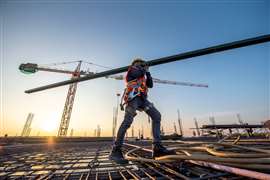Read this article in Français Deutsch Italiano Português Español
Tariff uncertainty weighs on US construction investment decisions
04 March 2025
 Image: bannafarsai via AdobeStock - stock.adobe.com
Image: bannafarsai via AdobeStock - stock.adobe.com
Construction spending in the US slipped by 0.2% from December to January, as trade tariffs threatened by US President Donald weighed on investment decisions.
That is according to analysis of a new government report by the Associated General Contractors of America (AGC).
AGC officials warned that spending on new construction projects could be negatively impacted by new tariffs on goods from Canada, Mexico, and China, as well as making projects more costly.
Spending totalled $2.2 trillion at a seasonally adjusted annual rate in January. The total was 0.2% below from the December rate and 3.3% above the January 2024 level.
Ken Simonson, chief economist of the AGC noted that construction spending increased at a 6.6% rate in 2024 as a whole—twice as fast as the latest year-over-year increase.
“Construction spending growth has been slowing under pressure from high interest costs and now the prospect of new waves of tariffs,” Simonson said. “There have already been notable cancellations and postponements for major manufacturing plants and the impacts of new tariffs are likely to lead to more delays and cancellations.”
The AGC urged the Trump administration to work quickly to resolve the underlying disputes and cautioned that prices on a range of construction goods would rise if tariffs were implemented.
“Higher interest rates are making it harder to get private sector projects approved, and these new tariffs are likely to prompt many developers to hit pause on new projects,” said Jeffrey H. Shoaf, the association’s chief executive officer. “We all want to see more domestic suppliers of construction materials, but undermining demand for construction isn’t the right way to stimulate new domestic capacity.”
Manufacturing construction spending fell 0.3% in January and the year-over-year growth slowed to 5.6% from 20% in 2024. Simonson noted that last week alone, Air Products pulled out of three planned projects and Intel pushed out completion of its $28 billion Ohio project from 2026 to 2031.
Meanwhile, educational construction dropped 0.6% from December; multifamily construction, fell 0.7%; and private office construction declined 0.5%.
These and other contractions outweighed increases in single-family homebuilding, which rose 0.6%; data centre construction, which climbed 1.9%; and gains in several infrastructure sectors.
Highway and street construction spending rose 0.6% for the month, sewage and waste treatment outlays increased 0.4%; and spending on transportation facilities edged up 0.1%.
STAY CONNECTED


Receive the information you need when you need it through our world-leading magazines, newsletters and daily briefings.
CONNECT WITH THE TEAM











